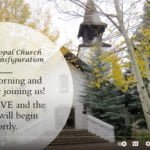Elemental. Raw. Energetic. God’s dynamic, energizing, and powerful presence, personal and palpable, whom scripture most often refers to as the Holy Spirit, the Spirit of God or simply the Spirit. We explored a bit of the Spirit in the closing days of Eastertide, available here and also here, but let’s go deeper with the Holy Spirit today. Even the biblical languages struggle to contain the profundity of God’s ephemeral, elemental presence as Spirit! רוּחַ in Hebrew, ruach (with that guttural ending like you are clearing your throat, roo-AKH) one of my absolute favorite Hebrew words…breath, wind, command, sign and symbol of life all fit comfortably inside ruach without even working it. Ruach is referenced some 193 times in the Old Testament, always from God and always life-giving or life-preserving. The Hebrew noun is mostly feminine in usage. The New Testament’s Greek counterpart, πνεῦμα or pneuma (from whence English gets pneumonia, pneumatic and the like) brings all of ruach’s multivariant meanings plus a few Greek additions like ghost, vital animating energy, life force. (The Greeks could conceive of a spiritual identity separated from a human body, hence the soul, whereas the earthy, pragmatic Semitic wilderness Hebrew has absolutely no original conception of such things) Both these words convey elemental and supernatural aspects of God, as in pillars of cloud, plumes of flame, conflagrations and raging storms.
Together these two terms account for almost all 111 references to the Holy Spirit in scripture…almost. But, like in Star Wars, there is another, and this other is the one to whom I gravitate as a believer . παράκλητος in Greek, transliterated parakletos, in English the Paraclete, translated in the Gospel of John (where it only appears) as the Comforter, the Companion, the Advocate, the Defender. Wow. The Johannine Church (stay with me dear readers, the Christian community, probably located in Ephesus, who produced the Fourth Gospel we call John’s Gospel) experienced God’s dynamic presence as the God who came as Jesus departed to return to God’s right hand. Their experience of the Holy Spirit was not akin to the English term….specter, phantom, apparition, wraith. Their experience was instead one of immense help, support, comfort, empowerment and protection.
Today I invite us to a reflection of the Holy Spirit as God’s epiphanic (ep-pee-FAN-ick is how we pronounce this descriptor) revelation to humanity. Like a warm fire crackling in the fireplace, the Spirit’s work is to animate, re-vivify, amplify and remind us of God’s power, Jesus’ witness and divine love. As the old Anglican evangelical saw goes, the fire outside the hearth is terrifying and destructive; the fireplace without a fire is dark, dirty and cold. But when the fire (God’s Spirit) burns properly within the hearth (us, our spiritual journeys, our faith), it illuminates and warms the entire house (our lives). And the Paraclete? Our Comforter, Companion, Consoler, Guide, Advocate and Personal Spiritual Security Detail. If you seek those transformational aspects of God’s daily presence, simply ask Him for the gift of the Spirit. God knows how to do the rest!
